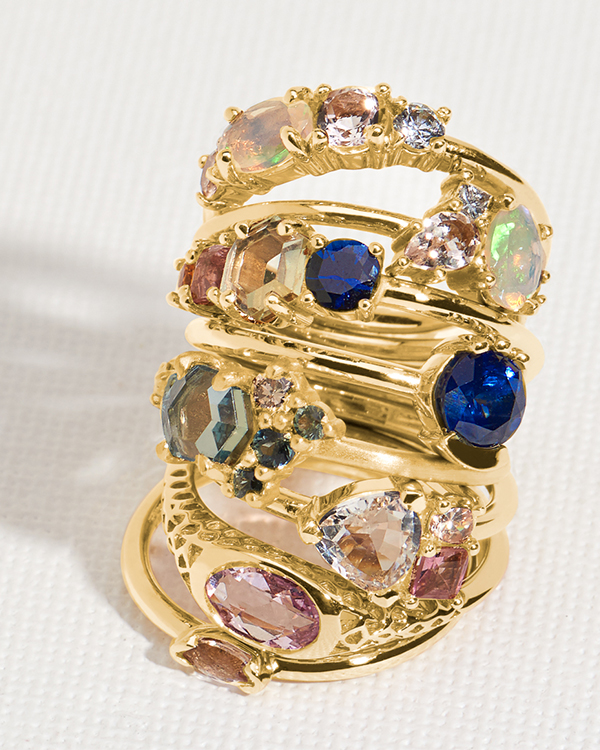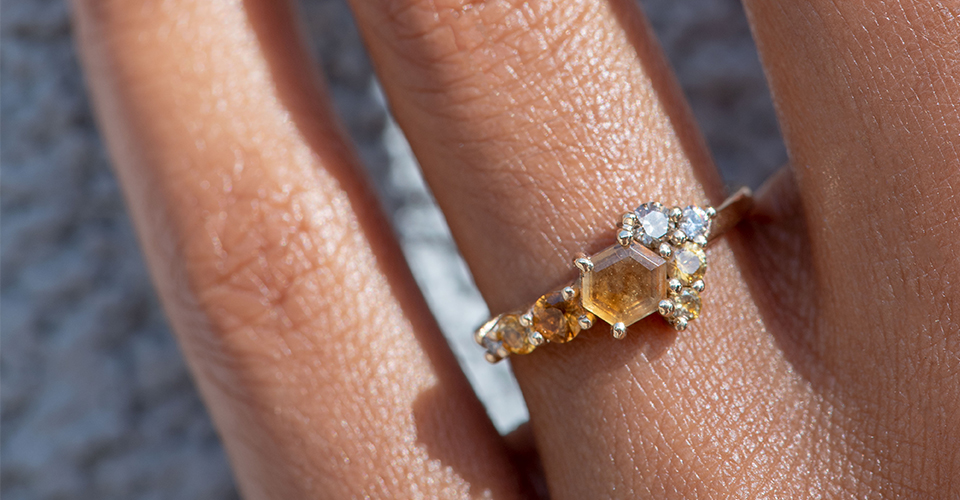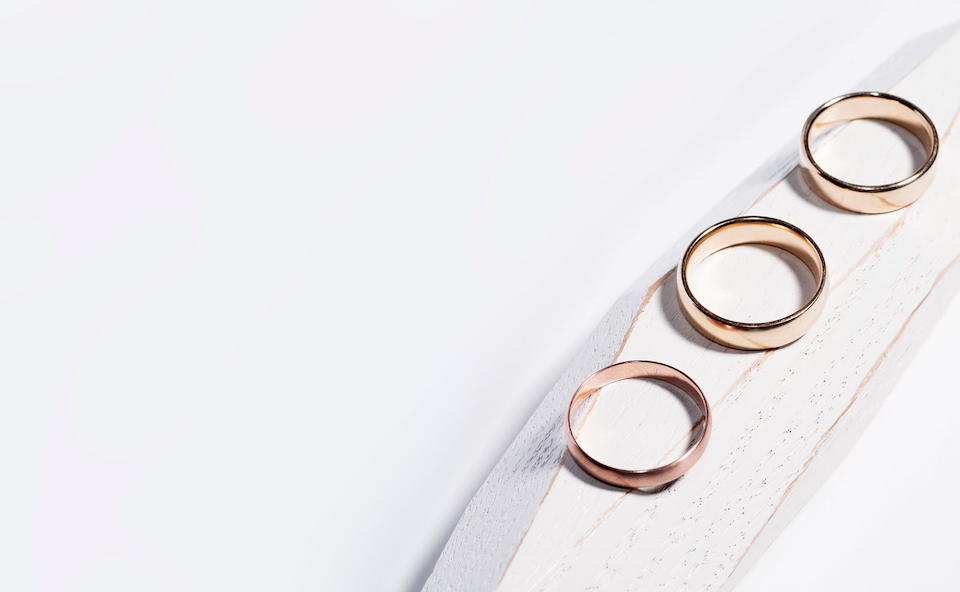
Bario Neal’s No B.S. Guide to Ethical Jewelry

Shopping for and custom designing jewelry should be fun, not homework. You might not buy a diamond engagement ring on a whim, but picking one out doesn’t need to be an “assignment” either. When it comes to being an ethical jewelry designer, however, the Bario Neal team likes to help curious clients figure out what’s sustainable and what’s questionable.
We’ve put together this (totally non-classroomy, we swear) guide about the jewelry industry, our push for fair-to-all practices, and our drive to be 100% transparent with our clients about where we buy the gemstones and metals that go into our engagement rings, wedding bands, and all the jewelry we craft.
How does Bario Neal design and create jewelry with sustainability in mind?
From the moment we pick up a pencil and start drawing new jewelry designs, we’re thinking about sustainability and ethics. Anna Bario and Page Neal, Bario Neal Principals + Lead Designers, have only ever wanted a company that creates meaningful, lasting pieces.
- We know that well-crafted jewelry (for kids too!) is handed down through generations, along with personal stories, and we take that responsibility seriously.
- We’re Made in the U.S., for real. We make our custom jewelry and collection pieces in our Philadelphia workshop, and also collaborate with local artisans on Philadelphia’s historic Jewelers’ Row to craft some of our jewelry.
- We don’t just craft our jewelry with sustainability in mind. We also work and live in our communities in a mindful way. We shop at neighborhood businesses. We volunteer in our community.
- We work with Fairmined gold. Bario Neal was one of the first jewelry companies to participate in the Fairmined Assurance label, and we now proudly offer Fairmined gold extracted by empowered and responsible small-scale and artisanal miners. The Fairmined certification is supported by a third-party auditing system that ensures that all participating miners meet rigorous environmental and social standards.
- We work closely with U.S. refineries that share our vow to minimize environmental impacts while producing recycled precious metals. The refineries are LEED certified, which means they find ways to reduce waste and air pollution and use minimal energy and water as they work. They treat and re-use production wastewater (called a “closed loop water system”).
- We work with clients to use heirloom gemstones in custom jewelry. We also use “recycled diamonds.” All of our reclaimed gemstones have been repurposed from old stock or other jewelry, which requires no industrial processes and avoids further human or environmental impac

How does Bario Neal advocate for improvements in the jewelry industry?
The jewelry industry has a complex history — one that includes great beauty and artistry, as well as horrific examples of exploiting communities and damaging environments around the world. We hope the Bario Neal approach to creating ethical jewelry inspires others, but our efforts don’t stop there. We advocate for change among all jewelry designers and retailers.
- We are members of Ethical Metalsmiths, a professional group with a goal to educate jewelers and jewelry buyers about how precious metal and gemstone resources can be a development tool, not a curse (and help the environment too).
- Bario Neal Principal + Lead Designer Anna Bario serves on the board of the Jewelry Industry Summit. She helped to organize the very first Jewelry Industry Summit in 2015 to create an annual gathering where we can actively work toward sustainable, ethical jewelry making in a way that benefits everyone who works in the industry. Bario Neal team members attend the summit every year to learn, talk about challenges and opportunities, and keep the momentum going for a fully sustainable jewelry industry.
- In 2014, we were part of the first group of jewelry makers to import Fairmined gold into the U.S. The Alliance for Responsible Mining (ARM), a leading expert on small-scale and artisanal mining, established the Fairmined standard and sets fair pricing to make sure that miners and their families and communities are economically and socially improving while staying environmentally responsible.
- We fully support an Obama-era law that requires U.S. companies to take care when sourcing metals from certain vulnerable regions, such as the Democratic Republic of the Congo. The law helps to ensure a purchase from a gold mine doesn’t end up funding an armed group or human rights abuses. We oppose all efforts to relax this law. We also recognize that by creating pathways for traceable, conflict-free minerals, our industry can help support sustainable development.
- We call for meaningful reform of the 1872 Mining Law. The outdated U.S. law allows mining on public lands (which big corporations have exploited for big profits) while failing to set up any protections for the environment and neighboring communities.
- With donations and gemstone purchases, we support the work of organizations such as Pure Earth and Pact. The first is a nonprofit that’s addressing pollution in low-and middle-income countries by training artisanal gold miners about alternatives to using the highly toxic (but unfortunately all too common) mercury. Pact is helping artisanal miners, many of them women, learn to accurately identify and sort gemstones so their work can become more lucrative.
How does Bario Neal choose to work with a gemstone or metal supplier?
We do relentless research and outreach to find people in the industry who share our priorities around ethical and sustainable sourcing. Our protocol requires sources that follow local labor, health, and safety laws, prioritize employee well-being, and don’t use child labor.
- We partner with sustainable mining organizations and initiatives. One example is the Tanzania Women Miners Association, a nonprofit formed to help women miners be financially sustainable.
- We didn’t launch an emerald jewelry collection until we found an emerald source in a mining collective in Northern Zambia that values people and the environment.
- We guarantee our diamonds and colored gemstones are fully traceable. If a Bario Neal diamond isn’t a recycled diamond, then it comes from Australia, Canada, or Namibia. We go deep — following a supply chain from mine to market.
- Many suppliers don’t want to invest in tracing smaller diamonds, also known as melee, for rings like eternity bands. We make sure our diamond suppliers are willing to go above and beyond to verify the standards of their stones. We were the first to bring traceable, ethical baguette diamonds to the market.
How does Bario Neal work to generate positive social impact?
- Advocating for human rights in the jewelry industry is a non-negotiable part of our mission. We’ve made a commitment to support healthy and happy working conditions for our entire supply chain, from miners to jewelers, and the larger communities that support them.
- We are an inclusive jewelry designer for every couple. When we work with clients, we don’t make assumptions about sexuality or gender. We’re longtime supporters of LGBTQIA rights and worldwide marriage equality. As a women-owned business, it is very important to us to support global feminist issues such as women’s reproductive health, equal pay, and access to education. We find ways to support entrepreneurial women inside and outside of the jewelry industry.
- We collaborate with like-minded artists and businesses so the effect ripples well past our own studios and neighborhoods. Supporting our local economy by hiring artists and artisans in our community is part of our business mission. We donate to worthy causes advancing all of the above! We make charitable giving part of our business model.

How does Bario Neal monitor and evaluate our environmental and social impact?
There’s not one industry enforcement group that oversees and makes sure jewelry designers and retailers act in a way that protects all people economically and socially. So Bario Neal has taken the lead, setting and following the highest standards for ethical sourcing.
We put our standards in writing so everyone on the Bario Neal team and our clients know what they are — and can hold us accountable. We are hard at work on our first-ever Sustainability Report (due out February 2019), which will detail our efforts to both mitigate/offset our environmental impact and create positive social impact through our jewelry.